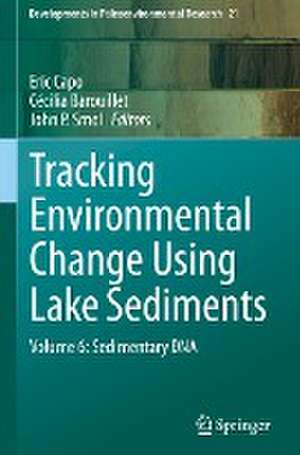Tracking Environmental Change Using Lake Sediments: Volume 6: Sedimentary DNA: Developments in Paleoenvironmental Research, cartea 21
Editat de Eric Capo, Cécilia Barouillet, John P. Smolen Limba Engleză Hardback – 19 dec 2023
This book, entitled Tracking Environmental Change Using Lake Sediments: Volume 6 – Sedimentary DNA, provides an overview of the applications of sedimentary DNA-based approaches to paleolimnological studies. These approaches have shown considerable potential in providing information about the long-term changes of overall biodiversity in lakes and their watersheds in response to natural and anthropogenic changes, as well as tracking human migrations over the last thousands of years.
Although the first studies investigating the preservation of these molecular proxies in sediments originate from the late-1990s, the number of scientific publications on this topic has increased greatly over the last five years. Alongside numerous ecological findings, several sedimentary DNA studies have been dedicated to understanding the reliability of this approach to reconstruct past ecosystem changes. Despite the major surge of interest, a comprehensive compilation of sedimentary DNA approaches and applications has yet to be attempted. The overall aim of this DPER volume is to fill this knowledge gap.
Din seria Developments in Paleoenvironmental Research
- 18%
 Preț: 941.82 lei
Preț: 941.82 lei - 18%
 Preț: 955.56 lei
Preț: 955.56 lei - 15%
 Preț: 650.86 lei
Preț: 650.86 lei - 18%
 Preț: 948.16 lei
Preț: 948.16 lei - 15%
 Preț: 664.43 lei
Preț: 664.43 lei - 24%
 Preț: 818.76 lei
Preț: 818.76 lei - 15%
 Preț: 647.40 lei
Preț: 647.40 lei - 15%
 Preț: 671.14 lei
Preț: 671.14 lei - 18%
 Preț: 805.92 lei
Preț: 805.92 lei -
 Preț: 409.13 lei
Preț: 409.13 lei - 15%
 Preț: 723.83 lei
Preț: 723.83 lei - 24%
 Preț: 1164.38 lei
Preț: 1164.38 lei - 18%
 Preț: 1133.61 lei
Preț: 1133.61 lei - 20%
 Preț: 612.58 lei
Preț: 612.58 lei - 15%
 Preț: 653.33 lei
Preț: 653.33 lei - 18%
 Preț: 969.44 lei
Preț: 969.44 lei - 15%
 Preț: 650.37 lei
Preț: 650.37 lei - 9%
 Preț: 1420.99 lei
Preț: 1420.99 lei
Preț: 912.89 lei
Preț vechi: 1201.18 lei
-24% Nou
Puncte Express: 1369
Preț estimativ în valută:
174.68€ • 182.87$ • 144.54£
174.68€ • 182.87$ • 144.54£
Carte tipărită la comandă
Livrare economică 01-07 aprilie
Preluare comenzi: 021 569.72.76
Specificații
ISBN-13: 9783031437984
ISBN-10: 3031437985
Pagini: 437
Ilustrații: XXIII, 437 p. 47 illus., 45 illus. in color.
Dimensiuni: 155 x 235 mm
Greutate: 0.89 kg
Ediția:1st ed. 2023
Editura: Springer International Publishing
Colecția Springer
Seria Developments in Paleoenvironmental Research
Locul publicării:Cham, Switzerland
ISBN-10: 3031437985
Pagini: 437
Ilustrații: XXIII, 437 p. 47 illus., 45 illus. in color.
Dimensiuni: 155 x 235 mm
Greutate: 0.89 kg
Ediția:1st ed. 2023
Editura: Springer International Publishing
Colecția Springer
Seria Developments in Paleoenvironmental Research
Locul publicării:Cham, Switzerland
Cuprins
Chapter 1. USING LAKE SEDIMENTARY DNA TO RECONSTRUCT BIODIVERSITY CHANGES.- Chapter 2. THE SOURCES AND FATES OF LAKE SEDIMENTARY DNA.- Chapter 3. THE SEDIMENTARY ANCIENT DNA WORKFLOW.- Chapter 4. BACTERIAL AND ARCHAEAL DNA FROM LAKE SEDIMENTS.- Chapter 5. CYANOBACTERIAL DNA FROM LAKE SEDIMENTS.- Chapter 6. PROTIST DNA FROM LAKE SEDIMENTS.- Chapter 7. DIATOM DNA FROM LAKE SEDIMENTS.- Chapter 8. AQUATIC VEGETATION DNA FROM LAKE SEDIMENTS.- Chapter 9. AQUATIC ANIMAL DNA FROM LAKE SEDIMENTS.- Chapter 10. TERRESTRIAL PLANT DNA FROM LAKE SEDIMENTS.- Chapter 11. TERRESTRIAL FAUNA AND HOMININ DNA FROM SEDIMENTARY ARCHIVES.- Chapter 12. AN OVERVIEW OF BIODIVERSITY AND NETWORK MODELING APPROACHES: APPLICATIONS TO SEDIMENTARY DNA RECORDS.- Chapter 13. PERSPECTIVES AND FUTURE DEVELOPMENTS WITHIN SEDIMENTARY DNA RESEARCH.
Notă biografică
Eric Capo is an Assistant Professor at the Department of Ecology and Environmental Science at Umeå University (Umeå, Sweden). Dr. Capo is the founder and the coordinator of the sedaDNA Scientific Society.
John P. Smol is a Distinguished University Professor at the Department of Biology at Queen’s University (Kingston, Ontario, Canada), with a cross-appointment at the School of Environmental Studies. He co-directs the Paleoecological Environmental Assessment and Research Lab (PEARL). Prof. Smol is editor of the journal Environmental Reviews and is the founding editor of the Journal of Paleolimnology.
Cécilia Barouillet is a postdoctoral researcher at UMR CARRTEL INRAE (Thonon-les-Bains, France). Dr. Barouillet is vice-president - communication of the International Society of Limnology (SIL) and on the board of the sedaDNA Scientific Society.
Textul de pe ultima copertă
This book, entitled Tracking Environmental Change Using Lake Sediments: Volume 6 – Sedimentary DNA, provides an overview of the applications of sedimentary DNA-based approaches to paleolimnological studies. These approaches have shown considerable potential in providing information about the long-term changes of overall biodiversity in lakes and their watersheds in response to natural and anthropogenic changes, as well as tracking human migrations over the last thousands of years.
Although the first studies investigating the preservation of these molecular proxies in sediments originate from the late-1990s, the number of scientific publications on this topic has increased greatly over the last five years. Alongside numerous ecological findings, several sedimentary DNA studies have been dedicated to understanding the reliability of this approach to reconstruct past ecosystem changes. Despite the major surge of interest, a comprehensive compilation of sedimentary DNA approaches and applications has yet to be attempted. The overall aim of this DPER volume is to fill this knowledge gap.
Caracteristici
This volume summarizes the state-of-the-art sedimentary DNA approaches to study past environmental changes Offers the first common workflow for SedaDNA processes Analyzes eight taxa for potential as paleo-indicators
